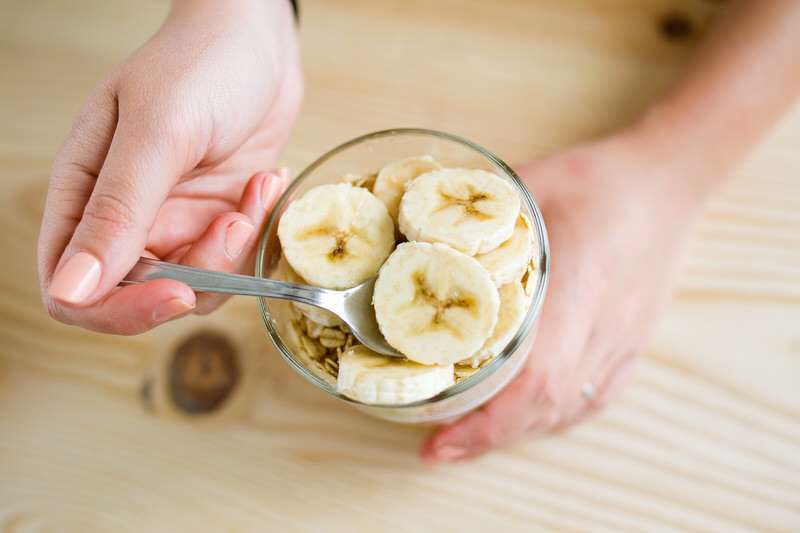Yes, you can develop a sudden allergy to bananas. It might be a sudden appearance of a genetic allergy or even because you have been spending too much time around latex. It can also be because of a banana intolerance due to a mistake in your digestion process. Either way, avoiding bananas for a long time is recommended, but even then, the allergy is not guaranteed to go away. Seeing an allergist can help you find out exactly what your options are.
Bananas are an amazing fruit with so many uses. You can eat one as a snack, create a fruit salad dessert with some ice cream, make a banana pudding/smoothie or use it as a post-workout snack.
It’s usually tough to even find a protein shake recipe that doesn’t have bananas in its ingredients because of the much-needed potassium and carbohydrates after a workout.
But what do you do when you suddenly get nauseous after eating a banana? It can’t possibly be an allergy since you’ve always been able to eat this tasty fruit without feeling sick.
But still, your stomach starts to hurt, you feel bloated, and you show symptoms similar to IBS (Irritable Bowel Syndrome). Could it be that you are allergic to bananas? Have you developed a sudden intolerance? Does this mean that you can never taste another banana again?
Why the sudden banana intolerance? Am I allergic?

Banana allergies are not very common. In most cases, the person is allergic to other things which were present on the banana. But if you feel sick immediately after eating a banana, you should first check for these symptoms.
- Itchy throat and mouth – Remember your digestive process starts in the mouth from the second you take a bite of the banana. Noticing any irritations in your throat after eating a banana can help you narrow down the causes, helping to identify if you have developed an allergy to bananas.
- Rashes – Another way to identify an allergy is by checking for a rash in your hand, which you used to hold the banana. Even holding a banana can trigger this symptom if you do have a banana allergy.
- Diarrhea and vomiting – Your body rushing to get rid of the contents of your stomach is a good indicator that something you ate is trouble. In this case, a banana allergy. But it is important to note that this symptom alone doesn’t mean you have an allergy to bananas.
- Anaphylactic shock – If you eat something you are severely allergic to, your body faces a life-threatening reaction named anaphylaxis. Your brain releases a huge amount of chemicals into your body, and your blood pressure drops. This happens in very extreme cases and is a definite sign of a banana allergy. And while going into an anaphylactic shock after eating a banana is a symptom of a banana allergy, this symptom also has the sub-symptoms of rashes, itchy throats, and nausea.
The symptoms of a banana allergy will differ from person to person. Sometimes the rash might not be even noticeable on your skin, while on the other hand, an extreme reaction such as anaphylaxis might even be fatal.
So the first thing to do when you feel sick after eating a banana is to check for any of the above symptoms. Because if you do show any of them, there’s a near-certain chance that you have developed a banana allergy.
What is banana intolerance?
Unlike a banana allergy, having an intolerance means that your body has mistaken the banana’s proteins as a foreign threat like a virus.
During the digestion process, sometimes small food particles escape into the bloodstream through your stomach wall. These are seen as a threat by your body, and they release anti-bodies to get rid of these food particles.
This process can also create rashes, diarrhea, nausea, and even headaches.
Looking at the above symptoms, it’s obvious that feeling sick after eating a banana can be caused by either intolerance or a banana allergy. So let’s take a look at the main differences between a banana allergy and a banana intolerance.
| Banana allergy | Banana intolerance | Description |
| Caused immediately after eating a banana. | Takes a couple of days after eating a banana to trigger. | In both cases, you will feel sick but this might be attributed to some other issue, because of the time taken for the intolerance symptoms to show. |
| Caused because of an allergy to the banana and its proteins. | Caused because of food particles escaping into the bloodstream. | The symptoms are similar but the effects are delayed in an intolerance. |
| May be permanent. | Bananas can be eaten again after avoiding them for some time. | The symptoms can disappear in both scenarios with time but are more likely to disappear in an intolerance. |
| Can be genetic. | Cannot be passed through genetics. | An intolerance is a flaw in your digestive process, unlike an allergy which can be passed on from parent to child. |
So if you’ve been eating a banana daily, it can be very easy to confuse the sick feeling you get to a banana allergy when it’s an intolerance.
How does a banana allergy make me sick?

Out of the many food allergies that people generally have, most are for nuts, milk, and eggs. So why exactly do more than a few people develop banana allergies? How does it make you sick?
This sounds surprising, but a banana allergy is very often linked with a latex allergy. You might have heard about how rubber trees are used to create latex.
What you may not know is that the proteins in the rubber trees that many people have allergic reactions to are almost identical to the proteins in some fruits (yes, including bananas).
And while some people are born with latex allergies, others can develop this allergy by simply being around latex too much. Once this allergy develops, you may very well get a banana allergy as a side effect. This effect is also called cross-reactivity.
To prove this fact, a study conducted in 1994 concluded a definite relationship between latex allergies and banana allergies. 31 patients allergic to latex were skin prick tested with banana, and up to 16 of the 31 participants showed an allergic reaction to the banana.
So if you do have a know latex allergy and you’re feeling sick after eating a banana, you might want to consider removing bananas from your diet for a while.
4 steps to cope with your banana allergy
- Visit your doctor. They can recommend an over-the-counter antihistamine or an epi-pen depending on how serious your allergy is. This medication can help reduce your symptoms if you accidentally eat some banana.
- Avoid bananas. This sounds obvious, but it’s not just eating or holding them you must avoid. Even flavored products or your lip balm might have bananas as an ingredient. This brings us to our next point.
- Always check the ingredients. Even when going out to a restaurant for lunch or maybe a date, make sure you know what’s in your food, especially if it’s fruit-related. Banana is a very common ingredient, and a quick word with the staff can help you find out what was used to make your meal.
- Avoid other cross-reactive fruits. Sadly bananas aren’t the only fruit to have similar proteins to latex. Be careful when trying to eat avocadoes, chestnuts, kiwi, apples, carrots, celery, papaya, potatoes, tomatoes, and watermelons. But if you don’t notice any symptoms after eating these fruits, there may be a chance that your banana allergy is not latex-related.
Can I become allergic to bananas if I never was before?

You might think that since you’ve always had bananas before without any issues, this sick feeling you’re getting could be an intolerance.
In most cases, allergies develop during your younger years (2 to 5 years old), and some even outgrow them in their 20s as their bodies adapt and become more tolerant of the allergen. But this is not always the case. There have been cases where an adult develops an allergy that they never had before.
A study conducted by Dr. Gupta looks into how common developing a food allergy as an adult is. Out of 43,443 adults, 10.8% had food-based allergies during the survey.
Nearly half of these adults had developed these food allergies as adults.
If you suspect that you’ve developed an allergy to bananas, you should consult your doctor for a conclusive diagnosis.
Since the many symptoms of allergies, intolerance, and even borborygmic are similar, having a professionals diagnosis can help you identify whether the sick feeling you get is because of a banana allergy.
But there is some good news. Many people are still able to eat cooked bananas even though they have an allergy to bananas.
This is because the proteins that cause the allergy disintegrate when it is cooked. But before trying this, always consult your doctor or an allergist to make sure you are not putting yourself in any further discomfort or danger.
Conclusion
Now that we’ve looked at why you feel sick after eating a banana, a food you previously enjoyed eating, you probably have enough information to identify if you have an allergy, intolerance, or neither. Either way, you might have to give up on having bananas again for some time at least.
You should also consult an allergist to get a professional opinion because even though your symptoms might be mild, they might get worse. You can also try cooking the bananas but make sure you consult a doctor before trying it.
Unfortunately, there is no known cure, but with a bit of luck and careful diet planning, the day may come where you can enjoy a nice cold banana sundae again.


